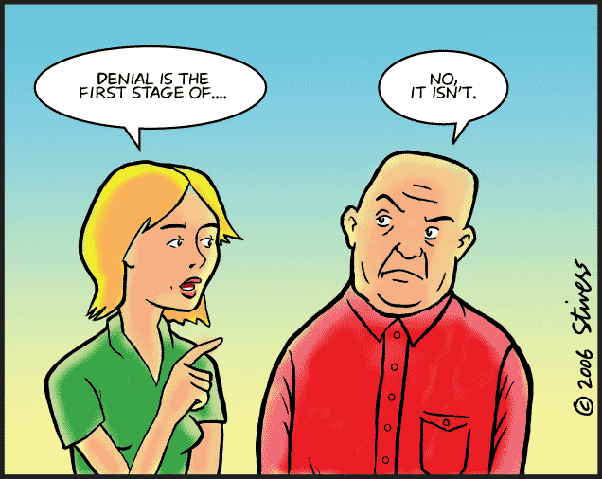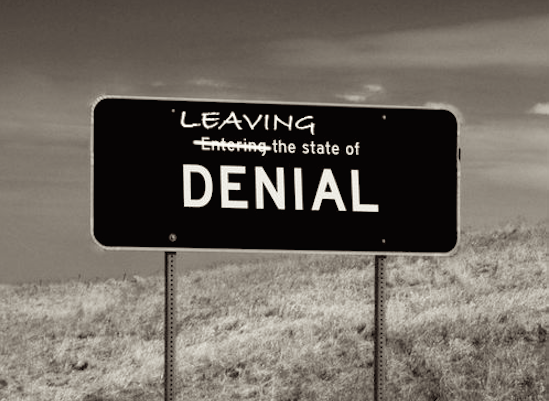Denial is one of the most insidious parts of a crisis because it can hinder people from taking action. It’s difficult to accept that we’re not in control and we need help. When we experience something bad, it can be hard for us to see what’s happening. But sometimes this is not good. This blog post is about how denial affects our reactions to crises. We will explore how you can overcome this natural human reaction.
Contents
What is Denial?

Denial is a mental state in which we refuse to accept that something bad has happened. We might not want to believe it’s true or we may try to ignore the evidence. This reaction can be very damaging in a crisis because it can keep us from getting help. Denial can also prevent us from taking action and making things worse.
Denial is frequently used as a defense mechanism when you are unwilling to face facts or reality. It might be because you’re avoiding something that appears daunting or stressful. In the short term, however, this defensive reaction may have a useful purpose. It can assist you in dealing with an unexpected shift in your circumstances. You could be able to accept, understand, and cope better if you take some time to adjust.
However, when denial is used as a long-term coping strategy it can be harmful. It may keep you from getting the help you need or dealing with difficult emotions. You might also ignore important warning signs that could prevent further tragedy.
Denial can have a detrimental influence on your life, particularly if it prevents you from addressing an issue or making a required transformation. In certain circumstances, it might prevent you from accepting assistance or receiving the treatment that they require.
Types of Denial
There are several different types of denial that people use when they find themselves overwhelmed by their emotions, which make it difficult for them to process information about a situation or problem. This can result in an appearance of lackadaisical behavior. The following are some types of denial:
- Denial of the Facts: In this type of denial, people refuse to accept that a situation or problem exists. They might be incomplete disbelief and insist that everything is okay. This can lead to people not getting help because they don’t think there is a problem.
- Delusional Denial: This type of denial is when people have a distorted view of reality. They might believe that something bad isn’t happening, or they might not be able to understand the severity of the situation.
- Angry Denial: When faced with difficult news or a traumatic event, some people respond with anger. This can manifest as hostility towards others who are trying to help, or as verbal attacks on the people who are giving them information.
- Passive Denial: In this type of denial, people might not be openly hostile, but they will go along with what others want and avoid conflict. They might also withdraw from family and friends.
- Negative Coping: People in denial often use negative coping mechanisms to deal with their emotions. This can include alcohol or drug abuse, self-harm, and eating disorders.
If you are experiencing denial, then it might be helpful to seek help from a therapist. They will work with you to confront your emotions and behaviors. This can be very difficult but is necessary if they want to resolve these issues before they become worse or more damaging.
Signs of Denial

There are some common signs that someone is in denial. People might exhibit these behaviors when they’re trying to avoid accepting a difficult truth.
- Refusing to believe something bad has happened
- Ignoring evidence or facts
- Saying things like, “It’s not that bad” or “This too will pass”
- Making excuses for a problem
- Believing that they can do it all themselves, without any help from others
You may also feel hopeless or helpless, in addition to the following symptoms: a lack of energy and motivation, irritability or anger, sadness or depression. You know there is something wrong that needs to be fixed on some level, but you believe that no matter what you do or say will make a difference. When others try to offer suggestions or assistance, you want them to mind their own business.
Reasons
Denial can be an effective psychological coping mechanism. It might help you deal with your conflicting feelings about a change in life circumstances or situation that has occurred.
- You may have experienced something traumatic, but are unable to process the information at first because it’s too painful to contemplate. If this is true, then denial could serve as protection against feeling overwhelmed. In this situation, it may be a good thing as you’re not facing something that would cause feelings of distress.
- Denial can also occur if you have experienced an event that is too difficult to accept or process immediately. You might believe that your emotions are going to get in the way and prevent you from dealing with things rationally. This could prevent you from taking action or accepting help.
Causes
- Denial occurs when you are overwhelmed by emotions that make it hard to think about your circumstances.
- You might not want to accept something bad has happened, so you try to focus on other things instead.
- When there is an issue or problem in our lives, we could assume its presence will last forever and can’t be resolved. This belief can lead to denial.
- In some cases, people might not be able to face the fact that they are powerless in a situation. This can cause them to enter into denial as a way of coping with their feelings.
- There could also be a fear of change or the unknown which leads individuals into denial about their current state or predicament.
When we’re unable to cope with a situation, it’s common to look for someone or something to blame. This often leads people into denial as they refuse to accept responsibility for what has happened.
Examples of Denial
If you or someone you know is experiencing denial, then one of the following examples could be true.
- A man who loses his job and refuses to look for work because he believes that no other jobs are available.
- When a couple gets divorced but pretends they are still together in certain social situations. This might occur if children are involved, or if there are financial reasons why they can’t afford to separate.
- Someone who is addicted to gambling but denies their addiction and continues spending money on lottery tickets or making bets at the casino.
- A woman who suffers from depression but insists that her life is fine when it isn’t due to her circumstances. She might not feel like anything is wrong, but her friends or family know that something is going on.
- A wife who knows she should leave an abusive relationship with her husband but doesn’t because he has threatened to harm himself if she does. She believes by staying in the marriage and protecting him from hurting himself, will keep their children safe as well.
Impact of Denial

If you are unable to process information about a situation or life change due to your emotions, then denial might be helpful. It could protect you from experiencing feelings of distress that can occur during times of trauma or loss. In these situations, it’s important for people not to push the person to face their situation. It can be damaging.
However, if you use denial to avoid dealing with problems or difficult emotions, then it can have negative consequences. You might be less likely to take action and could find yourself in a worse situation than you were before. Additionally, if you deny that something is wrong, you might not get help. And it might make the problem worse.
When denial is used to avoid difficult emotions, it can hurt our lives. We might not be able to get help or take action if we deny that something is wrong. Additionally, this avoidance can lead to further distress in the future. It’s important for those around someone who is in denial to try and help them realize what is going on.
Treatment of Denial
If you are experiencing denial, then it might be helpful to seek help from a therapist. They will work with you to confront your emotions and behaviors. This can be very difficult but is necessary if they want to resolve these issues before they become worse or more damaging.
Therapies for Treating Denial
Several different therapies can be used to treat denial. The most common is cognitive-behavioral therapy, which helps people to change their thoughts and behaviors. Other therapies include:
- Psychodynamic Therapy: This type of therapy looks at the unconscious mind and how it might be contributing to the person’s problems.
- Family Systems Therapy: This type of therapy looks at how the family dynamic might be contributing to the person’s problems.
- Behavioral Activation: This therapy helps people to identify and change their avoidance behaviors.
- Acceptance and Commitment Therapy: This therapy focuses on helping people accept their thoughts and feelings, and then commit to taking action.
If you are in denial, it is important to get help. The sooner you address the problem, the easier it will be to resolve it. Denial can hurt your life and the lives of those around you. It’s important to seek treatment if you find yourself unable to face reality.
Conclusion
The denial is the strongest defense mechanism. It’s often used in cases of guilt or when people are unwilling to accept something that would be difficult for them to deal with emotionally. Denial can come about because it protects against pain, anxiety and fear; this makes sense given how much we rely on our brains to help us make decisions quickly rather than overthink every detail. As a result, many use denial as their primary coping strategy since it allows us to avoid confronting reality until we’re ready…Denying these feelings may also prevent you from taking action which could eventually lead you down an even more destructive path where there’s no turning back.”
For more information, please contact MantraCare. Grief is a natural and complex emotional response to loss or change. If you have any queries regarding Online Grief Counseling experienced therapists at MantraCare can help: Book a trial therapy session


